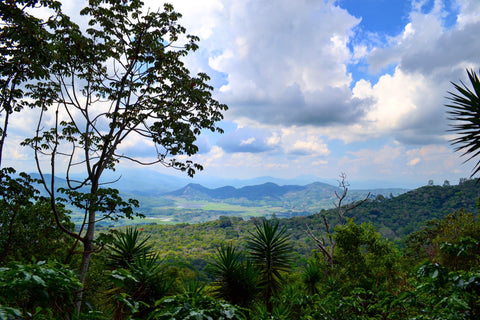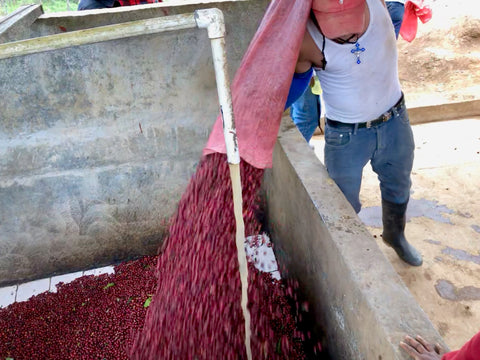In a few days, I return to El Salvador, only three short months after my first visit in May. As with any travel that exposes you to new cultures, new ways of life and living, traditions, etc., I learned a lot. Like much of Central America, El Salvador seems to be a paradox of proud, hard-working people doing great things for their native home, while that home struggles, and often fails to provide the basic infrastructure necessary for their success.
My first visit to El Salvador was in partnership with NCBA CLUSA - an international organization promoting agricultural cooperatives that is doing a lot of work in El Salvador, specifically around the coffee agriculture industry. The organization sponsored a two day event in San Salvador that brought dozens of El Salvadoran coffee growers together with a small number of American and Korean coffee professionals to evaluate the quality of coffee being grown in the region. My colleagues and I were blown away by the quality and consistency of coffee we tasted throughout the event, which led us to wonder why more of this coffee wasn’t found in the US market? As I began to talk with individual farmers, in hopes of building the foundation of a relationship we could use to source coffee in the future, I found that the reason El Salvadoran coffee isn’t as common in the US market is due to a lack of infrastructure to market and export it. This is ultimately what NCBA CLUSA is trying to address, but the reality is that without buyers and exporters focused on promoting quality versus price, roasters like Blanchard’s are not easily exposed to the fantastic coffees being grown.
This lack of connection between the producers of El Salvador and roasters in the US leads most small producers to sell their harvests on the commodities market, where buy/sell mills are paying the lowest possible price - sometimes lower than the cost of production - to farmers, then placing the coffees on the open market at the highest possible price. This is obviously great for the buy/sell mills, at least in the short term, but the lasting effect is a breakdown in sustainability. Producers can only lose money for so long before they make the calculus that it is more cost effective for them to abandon coffee production and grow something more profitable, or escape agriculture all together. Farm abandonment is one of the largest problems facing coffee agriculture in El Salvador, because farmers simply cannot afford to keep growing coffee, so they leave their farms behind and go to find work in cities and towns.
So when I reflect on what I saw and what I learned during my first trip to El Salvador, I’m both saddened and heartened; saddened by the fact that good people are working so hard to earn a living for their families and producing excellent coffee - coffee they’re proud of - but often don’t make enough revenue to cover their expenses; and heartened by the work NCBA CLUSA is doing on the ground, and by the fact that in three short months, we’ve been able to bring in three outstanding El Salvadoran coffees we otherwise would have never experienced, and we’ve begun the process of building connections between some of our trusted buyers and exporters to create a market built on transparency, fair pricing, and sustainability to open up the El Salvadoran coffee growing industry to more roasters in the US.
When NCBA CLUSA contacted me asking if I would be willing to be a featured speaker at the third annual International Conference on Sustainable Coffee in August, I jumped at the chance. Not only would it be an opportunity to speak to the importance of transparency, trust, and sustainable purchasing between roasters and producers, but it would afford me the opportunity to further solidify the relationships we have begun to form with producers in El Salvador. The benefit of spending time face to face with producers is somewhat intangible, but it is nonetheless important. So often, coffee producers work hard in the fields growing and processing coffee for their entire lives and never actually meet the people who buy, roast, and consume it. During my last trip I spent several hours at the home of a farmer named Mario who had never even met an American in general, much less had one visit his home, yet he had been growing and selling coffee to Americans his entire life, as did his father and grandfather before him, and as his daughter is learning to do now. We didn’t end up being able to buy his coffee this year, though it was outstanding, but I’ll remember Mario, his family, the hospitality they offered me, and the meal we shared, forever. Perhaps we’ll be able to purchase his coffee in the future, or perhaps we can help find other roasters to do so, but our time together, sharing a meal, stories, and a handshake made an indelible mark on my conscious.


The more time I spend with producers learning the work and skill involved in getting us the coffee we love, the more I want to share their story. I want them to know how much we appreciate and value their work and the passion they put into it, and I want to be able to add value to their daily life as they do the same for us and our customers. To me, that is far more than a simple business transaction. Yes, we do purchase a product from them - money is exchanged for goods - but after that is done, we’re still human beings connected by coffee, and mutually benefiting from each other. There are hundreds of people, on a global scale, involved in every cup of coffee we drink, and I feel far better calling that a relationship because it keeps me invested and reminds me that the picture is much bigger than roasting and bagging some coffee to sell.
--Stephen T Robertson
August 2018





